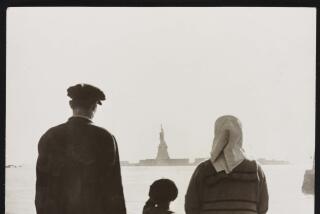Trust the truth
- Share via
DAVID IRVING IS THE KIND OF creep who will stand up in front of a crowd of Holocaust deniers and brag, “This hand has shaken more hands that shook Hitler’s hand than anyone else in the world.” As a once-respected World War II historian, he has arguably done more than anyone else alive to add a gloss of academic respectability to the grossly inaccurate notion that there were no gas chambers at Auschwitz.
Yet his sentencing this week in Austria to a three-year prison term for denying the Holocaust back in 1989 is a much more hateful expression than anything that has ever come out of Irving’s mouth.
Words don’t kill millions of people; governments and their armies do. Austria is hardly doing a convincing job of repudiating its own fascist history by using the blunt force of its police power to lock up a nonviolent, nonthreatening, noncitizen crank. And perversely (though predictably), the publicity generated from the case has given fresh oxygen to Irving’s unspeakable views.
And that’s just the practical objection. Symbolically, jailing a historian for his opinions is much more dire. Europe may have produced the two most murderous ideologies of the 20th century, but both were eventually defeated by the enduring product of the 18th: the Enlightenment. Thinkers such as Voltaire and Thomas Jefferson understood that progress is best advanced not through the edicts of rulers about what discourse is acceptable, but by the freest and most skeptical inquiry from all levels of society.
Ideas and scholarship should compete, and rise or fall on the strength of how they survive open peer review. By declaring certain ideas off-limits, many European governments, from France to Britain to nations of the former communist East, are showing a lack of faith in the truth to win out. British Prime Minister Tony Blair, for instance, recently pushed through a law prohibiting the “glorification” of terrorism, an act that will surely drive the country’s violence-espousing Islamic extremists into the shadows, where their conspiratorial worldviews will fester off the radar of both the public and the police.
At a time when Pakistani clerics are offering million-dollar rewards for the heads of Danish cartoonists, and European citizens (if not their governments) are making the most rousing defenses of free expression in a generation, the contrast couldn’t be more clear: Countries that tolerate free speech thrive; those that don’t, don’t. That principle is worth defending more than the “right” of people not to be offended or hear lies.
Although he made an unpersuasive, last-ditch courtroom conversion to accepting the Holocaust, Irving will now serve as a martyr to a movement that doesn’t deserve one — and a symbol of a weak governing class that has lost faith in one of the Continent’s greatest intellectual achievements. Even hateful speech should be free.
More to Read
Sign up for Essential California
The most important California stories and recommendations in your inbox every morning.
You may occasionally receive promotional content from the Los Angeles Times.













